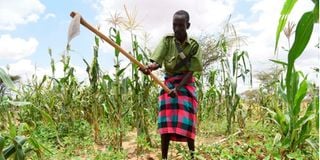End food insecurity to restore our self-esteem

Ewas Ng’imojong’ weeds his farm in Kang’eregai village in Turkana South, Turkana County on September 21, 2021.
What you need to know:
- The global crisis occasioned by the Ukraine war has presented a veritable conundrum for countries that are net importers of food.
- Overdependence on imported cereals is plainly uneconomical for it equates to a generous subsidy of foreign farmers.
One of the more heart-wrenching and harrowing images sometimes published in the media depicts an emaciated mother suckling a severely malnourished child. Yet the right to a decent meal is a basic human right.
Governments across Africa need to increase budgetary allocation to ramp up efforts to sustainably achieve food sufficiency. I am reminded that when Kenya’s ambassador to the UN Security Council, Dr Martin Kimani, recently condemned the Russian invasion, some dismissive pro-Kremlin social media users created a fake message that read: “Go end hunger in your country first.” It was not the only instance where Kenya’s agricultural failings made the country a laughing stock.
The war in Ukraine has upset the global food supply chains to the extent that major retailers in Europe have had to ration stocks while African countries are struggling to fill the deficit. And it could get worse.
Given that land is a major factor of production, my contention is for adoption of homegrown solutions. Africa is endowed with arable land, fairly predictable weather patterns despite the ravages of climate change and a young, active population which if harnessed would play a prominent role in enhancing food security. Any government worth its salt should feed its populace – all that is needed are the right policies that are properly implemented.
Hindering food security
The global crisis occasioned by the Ukraine war has presented a veritable conundrum for countries that are net importers of food. We envisage a situation where even with financial resources, a serious dearth of grains in the open market obtains.
With approximately 60 per cent of Kenya deemed arid and semi-arid lands, coupled with exponential population growth since independence, we have a perfect powder keg.
In fact, as recently as two months ago, half of Kenya’s counties were listed as food insecure. Overdependence on imported cereals is plainly uneconomical for it equates to a generous subsidy of foreign farmers, besides being a foreign exchange drain.
There are several bottlenecks hindering food security.
Land fragmentation is our existential bane: One would shudder at how our cultural set-up has strangely triggered a frenzy of minute land ownership – so miniscule that viability of productive activity is rendered nugatory. Diminishing land sizes is the major negative contributor towards reasonable food production locally. What became of the minimum acreage legislation? Poignantly, mechanisation and modern farming techniques remain hindered in squeezed settings.
Rain-fed agriculture
Development of highly productive novel seed varieties that would double current seed potential is important. Current maize seed varieties, for instance, have been in universal usage for a good four decades, which is unacceptable for a progressive society.
Kenya should also taper off dependency on one staple (maize) by boosting production and promoting consumption of other more drought-resistant food crops. In addition, setting up a self-sustaining fertiliser plant that would produce nutrients specifically suited for our local soil needs would improve production. Currently, fertiliser usage, given an astronomical surge in pricing, is at its lowest, with the attendant risk of a steep decline in agricultural output.
Then there is need to cut reliance on the age-long practice of rain-fed agriculture by adoption of modern irrigation methods as the case is in Israel.
In a nutshell, if the issues pointed out above are not properly addressed and implemented, one can surmise that food security remains a pipe dream. Sadly, in the short term, a major worldwide food shortage and continued price surge is foreseen. Policy makers and technocrats need to urgently re-examine the dire situation complicated by climate change. In Kenya and other African countries, our self-esteem will continue taking a beating as we constantly carry the begging bowl. This must stop.
Mr Momanyi is a social commentator; [email protected]





